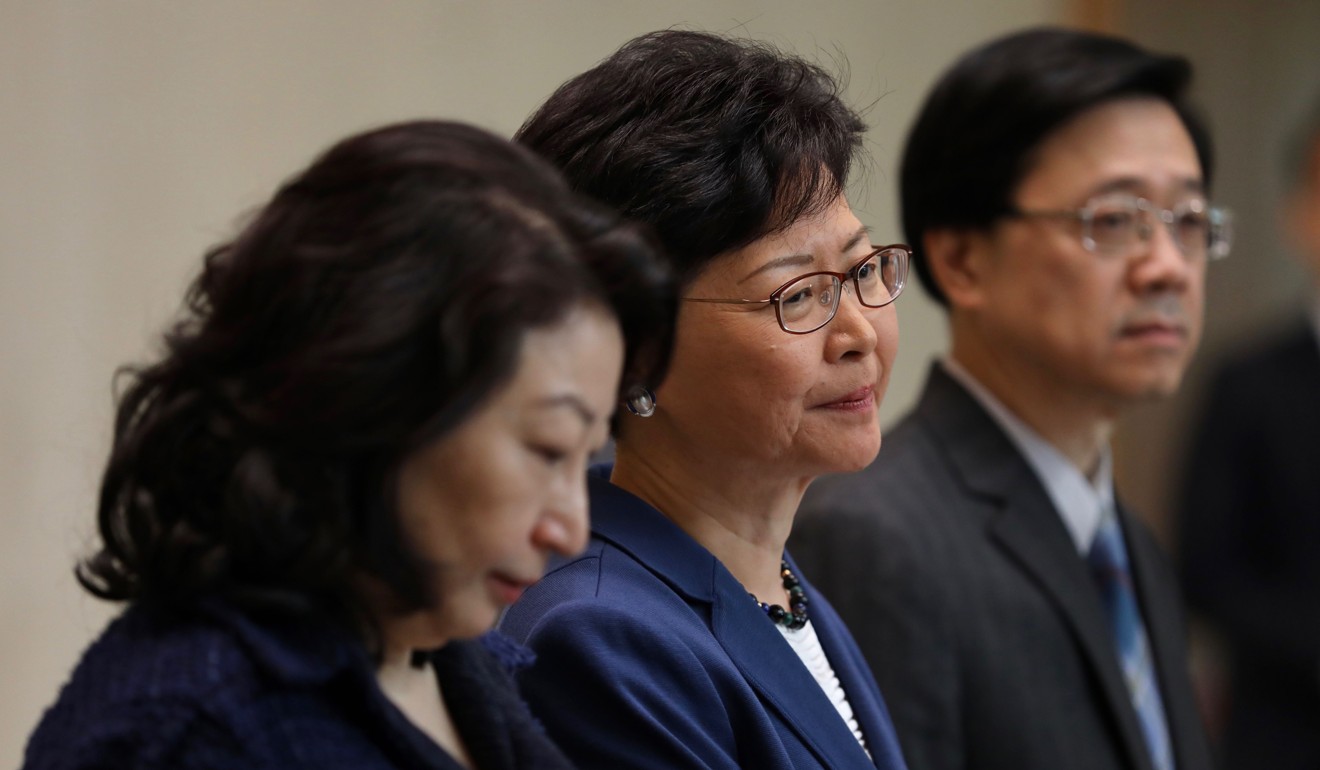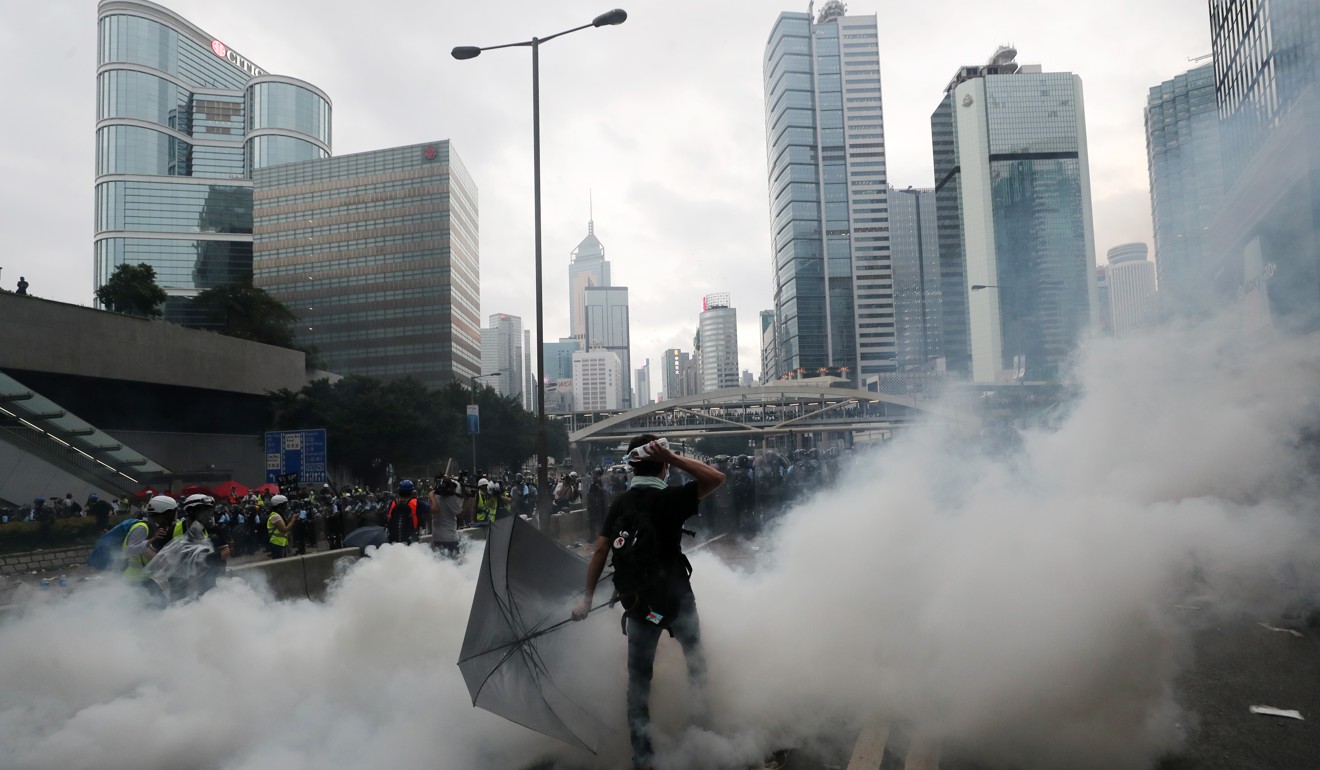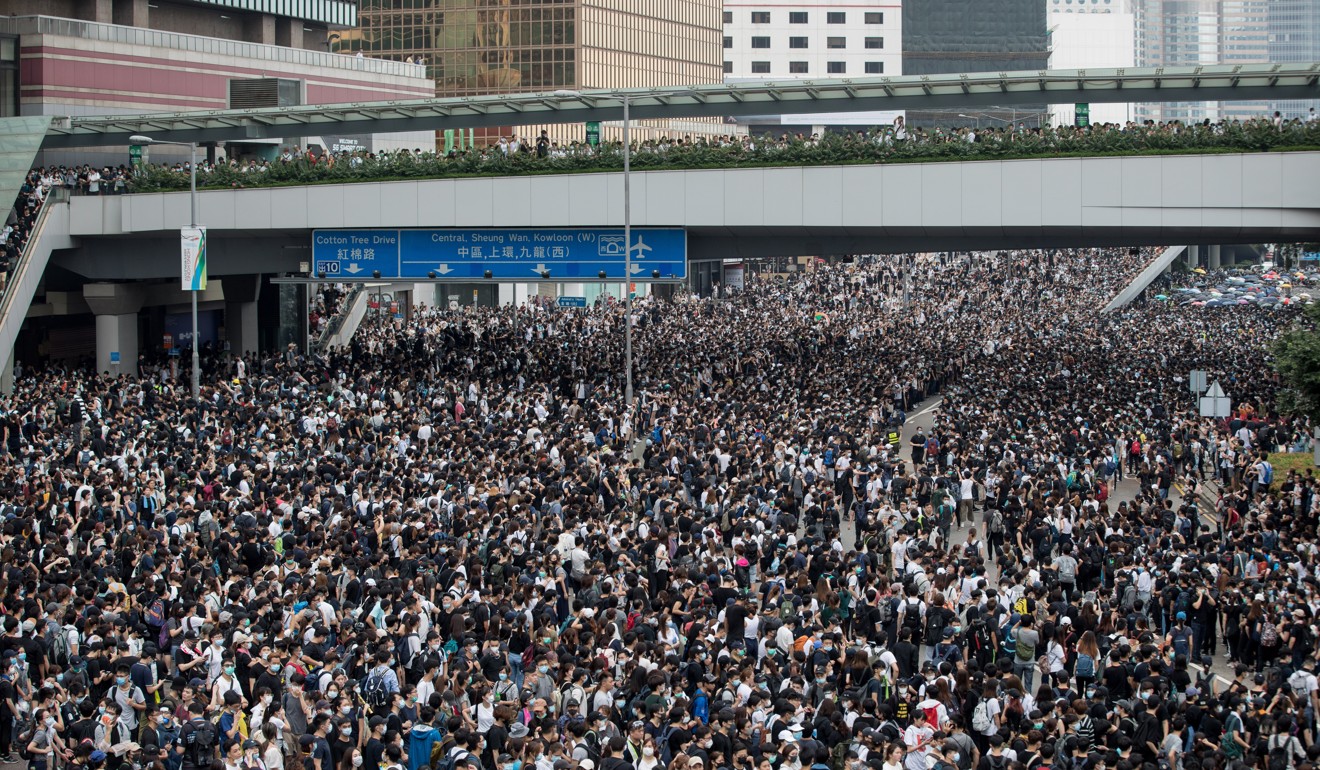
Will Beijing still support Carrie Lam after Hong Kong extradition bill debacle?
- City leader backs down to pause the bill following the pleas of her inner circle, just three days after vowing to press ahead with controversial reforms
- Source claims she met Chinese vice-premier before coming to decision, but Lam says the call to shelve legislation for now was hers alone
Three days after Hong Kong’s biggest protest march since the 1997 handover, Carrie Lam Cheng Yuet-ngor remained unmoved.
“The lady is not for turning” was a line that came to the minds of many who know her, evoking the steely utterance of the late British prime minister Margaret Thatcher in the face of resistance.
Lam gave an interview on Wednesday morning, taped at 8.30am at Government House, where she insisted she was pressing ahead with her controversial extradition bill.
Such was her defiance, even though hundreds of thousands had marched against the highly unpopular bill on Sunday and tens of thousands more were about to surround the Legislative Council that very morning.

Police in riot gear were already being mobilised at daybreak and protesters who had gathered overnight at Tamar Park were steadily organising to block roads leading to Legco.
Yet Lam maintained then she had a clear conscience in pushing through the bill, which would allow the transfer of criminal suspects to jurisdictions the city has no extradition deal with, including mainland China. The public’s anger over the bill was focused on the lack of confidence in fair trials on the mainland and the threat of political persecution.
The interview was later aired at about 5.30pm, timing that in hindsight appeared ill-advised, as violent clashes had by then broken out that afternoon between police and protesters near Legco.
That same evening, the government news service released another video, well after 8pm, where Lam slammed the many who took part in the chaos.
“Many people didn’t pay attention to the fact that by then she did not say if she would insist on resuming the second reading of the bill,” a source told the Post. The clashes did make her pause, he said.
“She started to ponder if there would be serious injuries or even deaths if the government continued to press ahead with the bill in the legislature. The potential risk to the stability of Hong Kong would be too big to gamble.”

After a day of consulting her aides, Lam came around to accepting she could not barge ahead. At her press conference, Lam said she met many people over the course of Thursday and Friday.
“All of them urged her to give a pause to the legislative process,” the source said.
They discussed then the suspension of the bill.
The source neither confirmed nor denied whether Lam met Han Zheng, the Politburo Standing Committee member who oversees Hong Kong affairs, before arriving at her decision.
But another source said Han was monitoring the city’s situation in the southern mainland city of Shenzhen this weekend and did meet Lam well before Saturday.
Lam was at pains during her press briefing to say she alone made the decision to suspend the bill and the central government supported her move.
“But the fact is the chief executive had a lot of work to do after making up her mind, including getting approval from the central government,” the first source said.
Hong Kong’s leader suspends extradition bill, but refuses to apologise
It was about 9pm on Friday when Lam called a high-level meeting with her ministers, including Chief Secretary Matthew Cheung Kin-chung, Financial Secretary Paul Chan Mo-po, Secretary for Justice Teresa Cheng Yeuk-wah and Secretary for Security John Lee Ka-chiu.
“The chief executive informed the ministers of the decision not to push through the bill and discussed the way forward on the issue, including the arrangements on Saturday, the meeting with the pro-government lawmakers and the press conference,” the source said.
It is understood that the key ministers still supported Lam in the need to amend the existing law to plug legal loopholes that enabled fugitives to reside in the city with impunity.
This was why they decided to signal to the local and international community and that the bill would be suspended rather than cancelled, as it would otherwise put their own credibility at risk.
Opinion: Decision to suspend extradition bill is a belated but right step forward
“But the government admitted the suspension of the bill was effectively tantamount to ‘withdrawal’ because it would be very difficult to revive it,” the government source said.
In 2003, with the ill-fated national security legislation to enact Article 23 of the Basic Law, the government first deferred the second reading on July 7, with the draft bill eventually withdrawn in September.
If the government does not reintroduce the extradition bill by July next year, it will lapse.
Lau Siu-kai, vice-chairman of the semi-official think tank The Chinese Association of Hong Kong and Macau Studies, believed Beijing had actually called on Lam to change her stance on the bill.
“National security is at stake in this issue. The Hong Kong government couldn’t have made the decision without the approval of the central government,” he said.
Tian Feilong, associate professor at Beihang University’s Law School in Beijing, believed the central government hoped to avoid further violence and bloodshed on streets by agreeing to suspend the bill.
“The central government wants to de-escalate from the current confrontation between Hong Kong police and protesters,” he said.
Another factor, he added, was that the central government did not want the distraction over the issue when it had bigger concerns to sort out, such as the trade and tech wars with the United States.
“The central government, which is tied in the trade war with the United States, doesn’t want to pay a heavy price in its handling of the controversy over the extradition bill,” he said.
Political commentator and University of Hong Kong academic Max Wong Wai-lun believed Beijing wanted to ease the tensions in Hong Kong ahead of the widely anticipated meeting between presidents Xi Jinping and Donald Trump on the sidelines of the G20 leaders’ summit in Osaka, Japan, on June 28-29.

The two leaders are expected to discuss how to settle the protracted trade war during their talks.
“If the confrontation over the extradition bill in Hong Kong drags on, it would become one of the thorny issues during the meeting between the two leaders,” Wong said. “Beijing wants to decouple the troubles in Hong Kong from the Xi-Trump talks.”
Wong added that the lingering controversy over the extradition bill had been used as political capital by Taiwan’s President Tsai Ing-wen in her campaign for a second term.
The Hong Kong government at first said the extradition bill was to help seek justice for the murder of a girl allegedly killed by her boyfriend Chan Tong-kai in Taiwan. Chan, a Hongkonger, returned to the city and escaped arrest. He has since been jailed locally on related money-laundering charges, but could be out by October.
But the ruling Democratic Progressive Party in Taiwan said it had no intention of extraditing him, even if the bill were passed. Tsai won her party’s nomination late last week to be its presidential candidate.
Extradition bill complicates an already tense US-China relationship
The government source admitted the administration had alienated many in Hong Kong, especially young people. “We have a mountain to climb to mend fences with various sectors in the community in the days ahead,” he said.
Lau criticised the Hong Kong government’s handling of the controversy and said Lam would find governing difficult in the coming years given the broken trust between her and the people.
Tian said the Hong Kong government might have had good intentions with the bill but lacked the political acuity to pull it off.
“The Hong Kong government handled the controversy poorly, such as only allowing a 20-day consultation on such a crucial issue,” he said.
Wong expected the opposition camp in Hong Kong to step up the momentum in calling on Lam to resign. “But Beijing will certainly back Lam at all costs,” he said.
Shi Yinhong, an international relations professor at Renmin University in Beijing, said the central government “will have a new assessment of the capability of a Hong Kong government headed by [Lam]”.
But he believed Lam unlikely to resign and the central government reluctant to let her.
“Her successor is not ready,” he said.
Analysts said the other certainty was that even though the lady turned, Lam was all but assured of being only a one-term chief executive.

